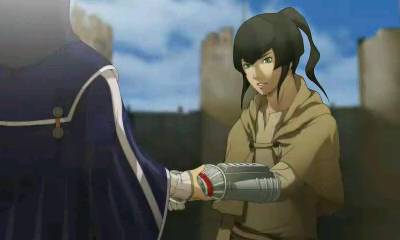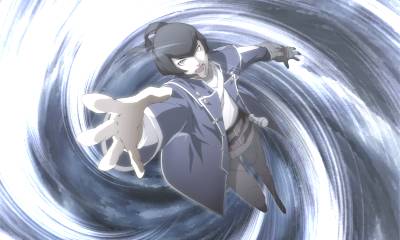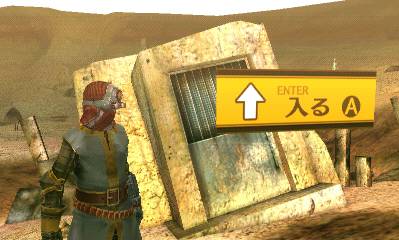Publisher: Atlus
Developer: Atlus
Medium: Digital/Cartridge
Players: 1
Online: No
ESRB: M
Whether you?ve been a Shin Megami fan since before Nocturne lit up the second hand market on PS2, or you?re a latecomer introduced to the glory of Persona 4, you?ll find something to love in Shin Megami Tensei IV on the Nintendo 3DS. Despite a 10 year gap between this and Nocturne, it?s clear that the team responsible for the SMT universe certainly know how to craft a solid RPG, borrowing elements from previous efforts across different platforms and combining them with new mechanics to make this a must have title on the 3DS.
This marks the first game in the series, whether it?s the main SMT line or the various spin-offs, built from the ground up for a portable system. (EDIT: And I’m completely wrong on this as the below comments points out: Devil Survivor 1 and 2 were developed for the DS, along with Strange Journey, all three predating this obviously.) We?ve seen ports of the Persona series on the PlayStation Portable and Vita, and some of the mechanics found there that make portable play a bit more friendly carry over here. For instance, navigating the main city found in the game early on is done through menu options instead of actually guiding your character down streets and avenues. This makes tasks like shopping for gear and goods, or picking up side-quests via a tavern, something that can be done quickly.
 Other mechanics that enhance the portable format come from the ability to save anywhere outside of battle, and the ability to reverse death. When you die in SMT IV you?ll have the option to resurrect, provided you can pay the toll to do so. If you don?t have the Macca available to buy your way out of limbo, you can use Play Coins instead, or simply start a tab with the underworld. My only real complaint with this element is that if you would prefer to wipe and just start from a previous save it takes a bit of button mashing to actually get to the game over screen, with no real option to entirely skip the underworld conversation, instead you can only speed through it.
Other mechanics that enhance the portable format come from the ability to save anywhere outside of battle, and the ability to reverse death. When you die in SMT IV you?ll have the option to resurrect, provided you can pay the toll to do so. If you don?t have the Macca available to buy your way out of limbo, you can use Play Coins instead, or simply start a tab with the underworld. My only real complaint with this element is that if you would prefer to wipe and just start from a previous save it takes a bit of button mashing to actually get to the game over screen, with no real option to entirely skip the underworld conversation, instead you can only speed through it.
Exploration in Shin Megami Tensei IV comes from dungeons, starting with an underground structure crawling with demons that slowly unveils into something larger. There?s a progression to the gameplay that might feel a little slow at first, something that isn?t uncommon for JRPG?s, but if you?re willing to stick with it past the sluggish couple hours that serve as the introduction you?ll find an addictive, complex, and wholly satisfying experience throughout the dozens and dozens of hours SMT IV takes to complete.
 This is aided by both the battle system and demon collecting/fusing that accompanies the exploration. The battle system isn?t far removed from the one introduced by Nocturne, and further adapted by the Persona series. You?ll focus on taking advantage of elemental weaknesses to gain additional turns in battle, outfit your team with demons gained by negotiations, and take care to guard your own defensive holes so as not to be taken advantage of. If you?re properly prepared you?ll be able to roll over most encounters with ease, but there?s some trial and error involved for most boss fights without the use of the packed in strategy guide.
This is aided by both the battle system and demon collecting/fusing that accompanies the exploration. The battle system isn?t far removed from the one introduced by Nocturne, and further adapted by the Persona series. You?ll focus on taking advantage of elemental weaknesses to gain additional turns in battle, outfit your team with demons gained by negotiations, and take care to guard your own defensive holes so as not to be taken advantage of. If you?re properly prepared you?ll be able to roll over most encounters with ease, but there?s some trial and error involved for most boss fights without the use of the packed in strategy guide.
Demon fusing and negotiations play a vital role in SMT IV also. When encountering demons in battle you can opt to talk to them, engaging in a number of conversations as you try to appease the demon and have them join you. These talks are often tricky to figure out, the demons tend to be finicky and unpredictable, and the cost for losing a negotiation can take a surefire win and turn it into an absolute disaster. But that risk/reward factor makes negotiating a lot of fun, even after you?ve seen the same dialogue options hundreds of times. The results are rarely the same across the various demons, and with an enemy roster as diverse as the one in SMT IV, demon negotiating is never tedious.
 Likewise, fusing demons gives added incentive to talk up as many enemies as possible. The system used for fusing demons isn?t too far removed from other SMT entries in the main series and spin-offs, so if you have any experience with SMT as a whole you?ll have a rough idea of how it works. Some neat factors include the ability for demons to whisper skills to the player character, allowing you to pick up new abilities throughout the game, or possibly enhance existing skills. It helps to give you a reason to keep a demon in stock even after it?s exhausted all learnable skills, since the whispering ability seems to happen randomly when a demon moves up a level, and you can benefit multiple times from a single ally.
Likewise, fusing demons gives added incentive to talk up as many enemies as possible. The system used for fusing demons isn?t too far removed from other SMT entries in the main series and spin-offs, so if you have any experience with SMT as a whole you?ll have a rough idea of how it works. Some neat factors include the ability for demons to whisper skills to the player character, allowing you to pick up new abilities throughout the game, or possibly enhance existing skills. It helps to give you a reason to keep a demon in stock even after it?s exhausted all learnable skills, since the whispering ability seems to happen randomly when a demon moves up a level, and you can benefit multiple times from a single ally.
On the story side of things I don?t want to give a lot away about the overall plot of SMT IV, but I think it?s worth saying that the opening world isn?t quite what it seems. There?s a lot of heavy hinting and the occasional awkward, obvious bit of foreshadowing, but it?s still fun watching some mysteries unravel throughout. I don?t feel like the characters featured in SMT IV are particularly great though, the supporting cast of human characters assisting the player character you guide never felt as unique or interesting to me as some cast members in other Shin Megami titles. But what the game lacks in characterization it makes up for in excellent music, sound design, and voice over work. While many elements of SMT IV feel tailor-made for portables, the presentation feels like something pulled right out of any big-budget console release.
Despite not being overjoyed with the cast of the game, there?s little else to complain about with SMT IV. The gameplay mechanics borrow enough from previous entries to feel familiar, but at the same time there?s enough new about the mechanics to make them feel fresh. Allowances are made for the portable format that makes it something enjoyable even for short bursts of time. The presentation doesn?t suffer due to the smaller format or hardware, and the controls fit the system design without feeling off or shoehorned in. Shin Megami Tensei IV is definitely a title that I?d suggest checking out sooner than later, worth picking up not just for its possible rarity, but because it scratches that RPG itch that few games in the genre have managed to do this generation.

